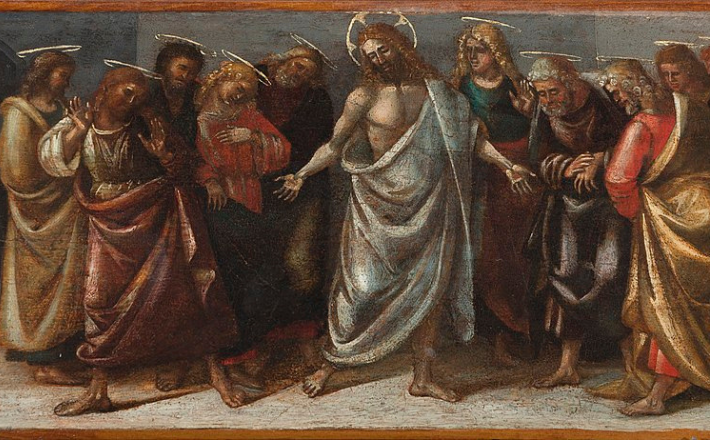Commentary on 1 John 1:1—2:2
First John begins mid-thought, caught up in the exuberance of proclamation that is often obscured in contemporary English translations. Many interpreters consider 1 John to be more of a sermon than a letter—in fact, it doesn’t have any of the components of a normal letter that we find elsewhere in the New Testament (namely, an opening or closing greeting).
Instead, our author simply jumps in to emphasize the importance of “the word of life” that was revealed; that the author claims to have heard, seen, and even touched (1:1); and that they are now proclaiming to the audience. Overall, this opening section of 1 John encourages its readers (and hearers) to remember this message of eternal life and to hold fast to their confession of Jesus’ life and resurrection so they might continue having fellowship both with God and with other believers (1:3–4).
Our passage proceeds in three main parts and contains a number of repeated words and phrases. The first four verses are often called the sermon’s prologue and are regularly compared to the opening verses of John’s Gospel. Yet, 1 John 1:1–4 also differs in significant ways from John 1:1–18, indicating this sermon’s differing focus.
Unlike the Gospel’s biographical focus, 1 John 1:1–2 shifts our attention to “the word of life” in ways that remind many readers of Jesus’ resurrection, and which has encouraged the lectionary to include this passage on the Second Sunday of Easter. Our author claims to have heard, seen, beheld, and touched this word of life, perhaps in reference to the disciples’ interaction with the Risen Lord (John 20:10–29). According to this reading, the author of 1 John grounds their authority in a personal connection to a witness of his resurrection.
At the same time, however, these opening verses do not describe Jesus’ resurrection directly, but rather emphasize the larger message of life the author proclaims. The focus on the message fits with the larger goal of 1 John to encourage its audience to remain faithful to the traditional teachings of the community instead of leaving with the “antichrists” (2:18–19; 4:1–6; see also 2 John 7). Nevertheless, Jesus’ resurrection is a crucial part of the author’s message. The description of a physical encounter with the “word of life” in these opening verses, therefore, prepares us for the challenges and encouragement that follow in 1:5–2:2.
The second section of our passage spans 1:5–10. In 1:5, our author summarizes their message with a short proclamation: “God is light and in him there is no darkness at all” (my translation). Starting from this foundational claim, the author explores what it means to be in fellowship with God despite human failings that draw us into darkness. Although any darkness threatens one’s fellowship with God who is entirely light, all interactions with darkness are not the same. The conditional statements in verses 6–10 rotate between negative and positive examples, each of which highlights the need for our words to cohere with our behavior.
Verses 6, 8, and 10 give negative examples and describe types of deception that come from denying our mistakes with ever-increasing severity. We may start by simply living as hypocrites (verse 6), but eventually we deceive ourselves (verse 8) and finally deceive others by calling God a liar (verse 10). This final assertion is perhaps surprising to us: How can anyone make God a liar? The logic of verse 10 comes from the two positive examples in 1:7 and 1:9. Rather than denying our sins, 1 John encourages us to confess and trust in God’s means of cleansing and delivering us from them: that is, Jesus Christ.
If we claim that we have never sinned, then we proclaim God’s sending his Son as our means of forgiveness to be unnecessary. Thus, God lies by stating that we need any cleansing at all! The absurdity of such a statement draws us to the author’s point of view; we know that believers have sinned and continue to do so. Rather than a lie, God shows us the very definition of love by rescuing us from our sins by sending Jesus Christ (4:7–10).
Our pericope ends in 2:1–2 with a reminder not only of what Jesus has done by living on earth and dying on the cross, but also of what he continues to do on our behalf before the Father. In this way, the author builds on the image of Jesus’ ongoing ministry described in 1:7 and 9.
Look closely at the language in the Greek, and you find that Jesus’ blood is “cleansing” (present tense) believers who continue to confess and to trust in him (1:7). This use of the present tense continues in 2:1–2, which claims that “we continue having an advocate before the Father, Jesus Christ, righteous one.” Moreover, this advocate “is the means of forgiveness for our sins” and for those of the “whole world” (my translations and emphasis). In other words, Jesus’ work continues long beyond the moment of his death upon the cross.
As our Risen Savior, he stands before the Father, cleansing us with his blood and interceding so we might continue having fellowship with God despite our mistakes. Such a reality is not a warrant for believers to sin without thought, but it is a comfort for believers who recognize their mistakes and continue relying on a living Jesus. For 1 John, therefore, confessing Jesus’ resurrection is a vital part of how we continue to have fellowship with God and one another. As we remember Jesus’ resurrection in this Easter season, let us reflect on his continued ministry on our behalf.
Risen and advocating on our behalf, Jesus still shows us the depth of God’s love and the victory of God’s light in a world often shrouded in sin’s darkness.



April 7, 2024